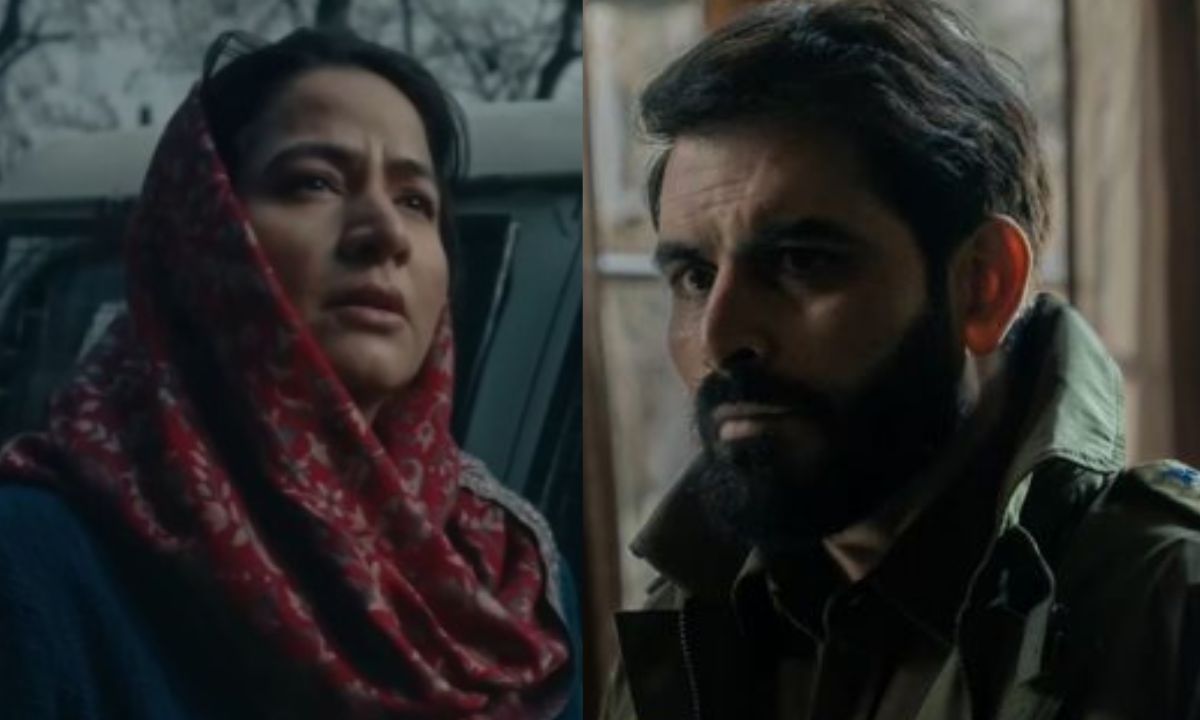The chilling string of events that caused wrath and suffering to the Kashmiri Pandits has been presented to us in several ways through the medium of cinema. In these films, some historical facts are picked up and creative liberty is taken to mould them in a certain way. Baramulla, starring Manav Kaul and Bhasha Sumbli, also brings forth the same topic but packages it with new ideas and techniques. Directed by Aditya Suhas Jambhale, the film merges the real world with supernatural elements and reaches a point where the lines blur between them. It’s daring and experimental, but how much of it works for Baramulla? Here us telling you that?
Plot
Based in Kashmir’s Baramulla, the film starts with the case of a child’s disappearance during a magic show. The investigation is carried out by DSP Ridwaan Sayyed who struggles with a dark past. Parallel to this plot, the narrative also keeps shifting to Ridwaan’s family experiencing some dark energies in their new house. First, their son Ayaan (Rohaan Singh) confronts the ghost of a child, then his daughter Noorie (Arrista Mehta) and eventually his wife (Bhasha Sumbli) also feels the supernatural elements around. The case of the missing children and the past of the haunted house come together to finally give us a closure. Baramulla sheds a haunting light on the traumas faced by the Kashmiri pandits and their descendants while simultaneously, the film also gives a strong POV on the problems faced by Indian Kashmiri Muslims.
Performances
Manav Kaul has a strong screen-presence, and he perfectly moulds himself into DSP Ridwaan Sayyed. A character who is determined to crack the case in hand, but is struggling on the personal fronts, with unresolved conflicts.
Bhasha Sumbli’s performance comes through strongly in the second half of the film when problems escalates, and she uncovers the mystery of the supernatural elements inside the house.
Arrista Mehta and Rohaan Sinhg also portray a very mature and nuanced performance as Ridwaan’s daughter and son respectively.
The Two Worlds
Baramulla attempts to try something new with a story that we have seen before. And, credit where credit is due. The transition from a slow-paced narrative to an intense merging of the two worlds is so smooth, that one doesn’t want to blink even for a second. The storytelling amps us, the camera movements instantly make us a part of the moment, and the thrill is felt in the atmosphere.
In that brief moment, the actors who play the characters from the past are phenomenal. They leave a strong impact on us which stays a little longer after the end credits roll. Kudos to the director Aditya Suhas Jambhale, DOP Arnold Fernandes and editor Shivkumar Panicker for pulling this off so efficiently. While the inspiration of the plot is the same that we may have seen multiple times but Baramulla dares to add creativity and a different kind of experience to it. This vision is successfully brought to life on the screen.
Writing
Not just visually, but through its story too Baramulla interestingly re-tells the bone-chilling incidents that went down in the history of the Kashmiri Pandits’ families and the how young children brainwashed into becoming militants. However, the story struggles a bit with pace and feels disconnected. The events are disjointed with the narrative rushing from one scene to another inconsistently. The struggle with storytelling is the reason why emotions are hardly felt, performances no matter how good fail to create an impact. The subplots are also undercooked especially Ridwaan’s past. Some cliched and flat characters like Aditya Koul’s militant Khalid are also a huge problem in the the film.
Verdict
Baramulla starring Manav Kaul and Bhasha Sumbli is visually quite impactful especially during the last 40 minutes of the show. Initially, the film feels a little slow, loosely connected, and less emotionally driven but it picks up suprisingly well, and we don’t see that coming. The actors have delivered strong performances, although, the characters deserved a little better writing too. However, while this screen is visually meant for the big screen, and I was lucky to watch it that way, I wonder how much of movie-watching experience would be justified on the small-screens! The film is out on Netflix.

